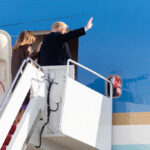-
China raised tariffs against U.S. imports by 125%.
-
The move comes after the U.S. increased tariffs on Chinese products.
-
China said that it would not respond to any further tariff increases by the U.S.
China will increase tariffs against U.S. imports by 125% from April 12, 2025. The move comes after the U.S. decided to raise tariffs to the same level on Chinese goods. Beijing says the U.S. move is a violation of economic and trade norms.
Tariff Increase by the U.S. Tariff Increase
Today, April 11, the State Council Tariff Commission has announced the increase in tariffs. The new rate replaces the previous 84% tariff that was set in March. The decision comes after the U.S. government announced on April 10 that it would raise tariffs for Chinese exports up to 125% as part of a “reciprocal” tariff plan.
China’s new tariffs on imports from the United States will affect many goods. The commission stated that U.S. goods are not viable on the Chinese market with the current tariff levels.
RelatedBillionaire investor Ray Dalio Warns That Tariffs Are Only The Beginning
The statement stated that “given the fact that there is no market acceptability for U.S. products at this level, China would ignore any further moves made by the United States.” The new measures are based upon China’s Tariff Laws, Customs Laws, and Foreign Trade Laws, as well as principles of international law.
The commission also stated that all previous provisions will continue to be applicable. These earlier measures included lists of affected products as well as tariff schedules.
Finance Ministry: U.S. Tariff Strategy “A Joke”
China’s Finance Ministry has also condemned the latest U.S. action. “Even if U.S. continue to impose higher duties, it will not make economic sense and become a joke in history of the world economy,” said the ministry.
The statement stated that if the U.S. continues to violate China’s interests in a significant way, China will counterattack and fight until the end.
U.S. Tariff Policy and Global Response
The U.S. imposed “reciprocal” duties on a wide range of products earlier this month. China was denied the 90-day suspension granted to many other countries.
In a post on social media, President Trump accused China for showing “a lack respect” to global markets and announced a 125% immediate increase.
In Europe, German finance minister Joerg Kukies stated that the EU could consider its response in the event of a failure of talks with the U.S. He urged the EU not to be too rigid, pointing out that Europe has a surplus of goods and a deficit of services. He also called on Europe to strengthen its digital services in order to reduce its reliance on U.S. suppliers.
Crypto Market Trades Sideways
This rapid escalation of US-China trade friction affected cryptocurrency markets immediately, creating significant volatility. Bitcoin, for example, fell below $74,000, before recovering to $81,500. Ethereum also traded lower at the same time. It fell over 2% within 24 hours, to close to $1,548.
RelatedTariff shock reveals a two-tier crypto market: BTC vs everyone else?
Analysts attribute this decline to investor concerns about the global economic slowdown, and rising inflation caused by the tariff war. While the immediate impact was negative, some market observers suggest that cryptocurrencies such as Bitcoin could gain in popularity over time.
They believe Bitcoin is a hedge against financial instability, particularly if geopolitical tensions continue.
This site is for entertainment only. Click here to read more






